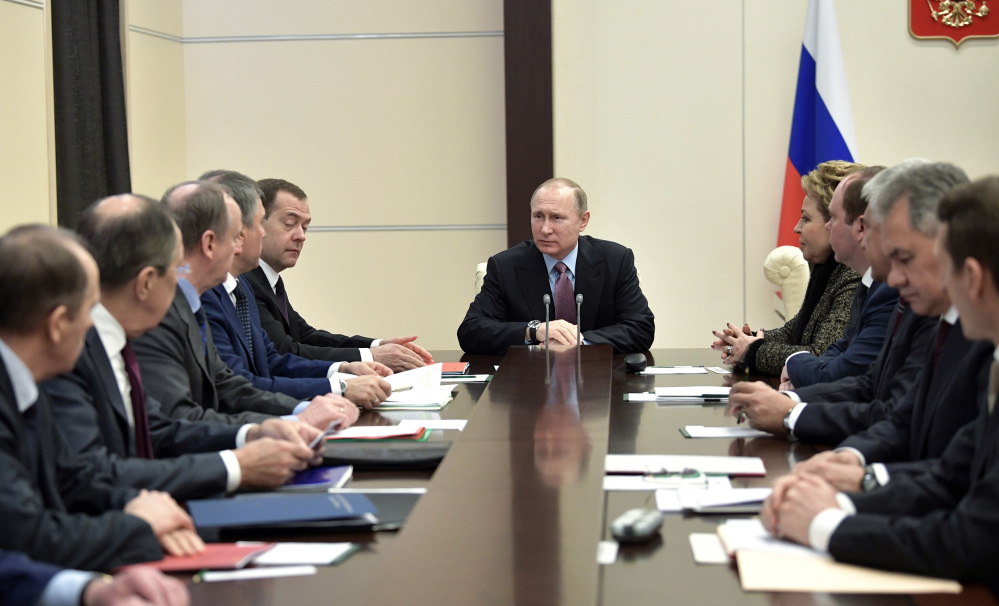WASHINGTON — Will President Trump usher in a new era for U.S.-Russian relations, or are the two powers going to continue down the path as geopolitical foes?
Now that Russian President Vladimir Putin has held his first conversation with America’s newly inaugurated leader, attention turns to the fate of U.S. sanctions against Moscow and whether the two will look to enhance military cooperation against the Islamic State group.
Trump was noncommittal about whether he was considering lifting the economic sanctions ahead of the call, saying Friday, “We’ll see what happens. As far as the sanctions, very early to be talking about that.”
While the White House has yet to comment on Saturday’s phone call, the Kremlin released a statement hinting that the two men discussed the sanctions, implemented by the Obama administration as a consequence of Russia’s actions in Ukraine.
The two leaders emphasized the importance of “restoring mutually beneficial trade and economic ties between business circles of the two countries, which could additionally stimulate the incremental and sustainable development of the bilateral relationship,” the Kremlin said.
Putin and Trump will also maintain “regular personal contact” and will begin preparations for a face-to-face meeting.
MOSCOW WANTS RESET
The Kremlin has applauded Trump’s promises to rebuild U.S.-Russian relations, which have been pushed to their worst level since the Cold War by the Ukraine crisis, war in Syria and allegations of Russian meddling in U.S. elections.
The Kremlin said that Putin and Trump spoke in particular about international issues, including the fight against terrorism, the Arab-Israeli conflict, Iran’s nuclear program, the situation on the Korean peninsula and the Ukraine crisis.
“The presidents spoke out in favor of the establishment of real coordination of Russian and American actions with the aim of destroying the Islamic State,” according to the statement.
In 2014, Russia annexed Ukraine’s Crimea region and backed separatists fighting government forces in eastern Ukraine, drawing condemnation in Europe and the United States.
In response, sanctions were implemented against sectors of Russia’s economy, including financial services, energy, mining and defense.
Shortly before leaving office, President Obama also ordered sanctions on Russian spy agencies, closed two Russian compounds in the United States and expelled 35 diplomats that he said were spies. These sanctions followed an assessment by U.S. intelligence that Moscow meddled in the 2016 election to help Trump become president.
Trump’s tempered approach to U.S.-Russia relations has already raised concern among several European allies who believe keeping Russia in check is essential to regional security.
British Prime Minister Theresa May said Friday in Washington, “We believe the sanctions should continue.”
Vice President Mike Pence and other senior advisers joined Trump for the call with Putin, including his national security adviser, retired Gen. Michael Flynn, chief of staff Reince Priebus and senior strategist Steve Bannon. Trump also spoke on Saturday with the leaders of Japan, Germany, France and Australia.
WARNING FROM REPUBLICANS
Two Republican senators – Arizona’s John McCain and Ohio’s Rob Portman – warned the White House about easing any punishments on Moscow.
“I hope President Trump will put an end to this speculation and reject such a reckless course,” McCain said in a statement. “If he does not, I will work with my colleagues to codify sanctions against Russia into law.”
Portman said lifting the sanctions “for any reason other than a change in the behavior that led to those sanctions in the first place would send a dangerous message to a world already questioning the value of American leadership and the credibility of our commitments after eight years of Obama administration policies.”
McCain takes a dim view of trying to reset relations with Moscow and says Trump should remember that Putin is “a murderer and a thug who seeks to undermine American national security interests at every turn.”
McCain and Portman are part of a bipartisan group of senators who have introduced legislation designed to go beyond the punishments against Russia already levied by Obama and to demonstrate to Trump that forcefully responding to Moscow’s meddling isn’t a partisan issue.
The bill would impose mandatory visa bans and freeze the financial assets of anyone who carries out cyberattacks against public or private computer systems and democratic institutions.
The legislation also mandates sanctions in Russia’s energy sector and on investments in the development of civil nuclear projects to rebuke Moscow for its provocations in eastern Ukraine and military support for Syrian President Bashar Assad.
Copy the Story LinkSend questions/comments to the editors.



Success. Please wait for the page to reload. If the page does not reload within 5 seconds, please refresh the page.
Enter your email and password to access comments.
Hi, to comment on stories you must . This profile is in addition to your subscription and website login.
Already have a commenting profile? .
Invalid username/password.
Please check your email to confirm and complete your registration.
Only subscribers are eligible to post comments. Please subscribe or login first for digital access. Here’s why.
Use the form below to reset your password. When you've submitted your account email, we will send an email with a reset code.